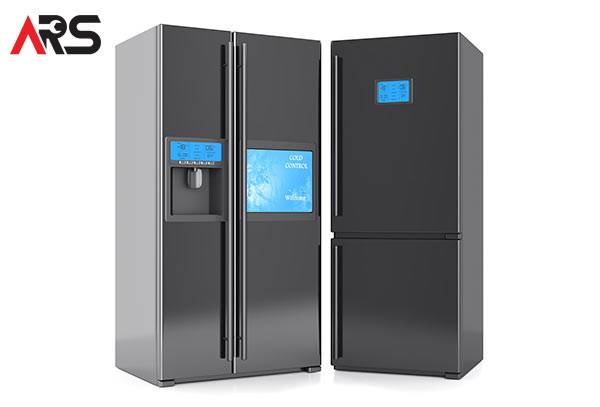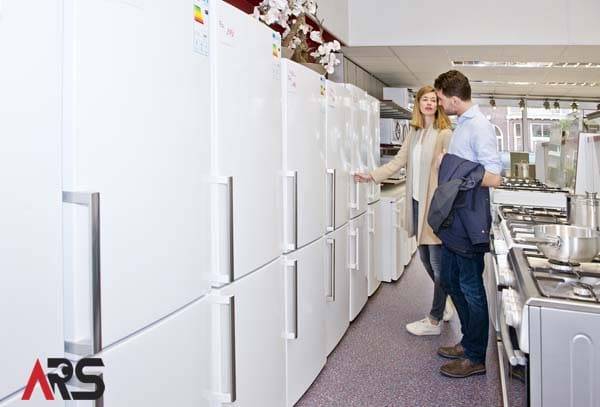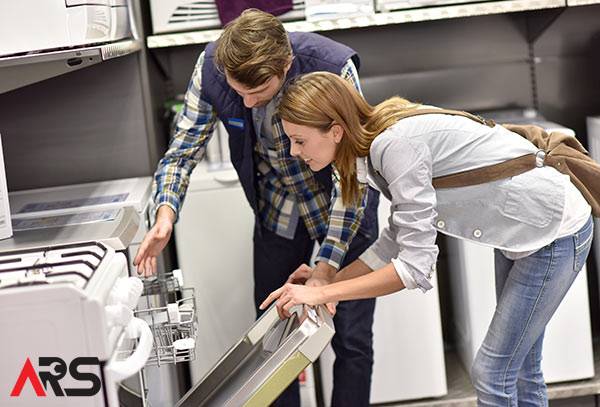What is a Smart Refrigerator and Why Should You Consider One?
Smart refrigerators are the future of kitchen appliances with better features that go way beyond simple cooling and food storage. Unlike traditional refrigerators that must be manually set for temperature and organization, smart refrigerators leverage current technology like Wi-Fi, touch screens, and artificial intelligence (AI) to be more efficient. These high-tech appliances are able to track food inventory, suggest recipes based on ingredients, and even remind you that you require groceries. With digital assistants built-in and remote control via smartphones, smart fridges are providing ease of use, energy efficiency, and seamless integration into our smart homes today.
The key difference between a smart fridge and a standard model is automation. While a regular refrigerator chills food according to pre-programmed temperature levels, a smart refrigerator learns user habits, adjusts cooling zones according to the same, and provides real-time freshness information. Internal cameras are available in most models to allow users to see what’s inside the fridge from anywhere, reducing unnecessary trips to the store. Voice-control features, integration with smart home ecosystems, and personalized meal preparation are some other innovations that also render these devices more interactive and convenient than ever before.
As the smart home technology evolved, the smart refrigerator emerged as a choice option. Smart refrigerators are all about solving these needs of simplicity of home chores, reduced food waste, and power efficiency. Smart refrigerators give automation and customization and hence are completely worth investing for homeowners with tech savviness. As the technology goes ahead further, appliances like this will continue to be more high-tech, with much greater convenience and efficiency in the kitchen.

What Features Make a Smart Refrigerator Stand Out?
Smart refrigerators are packed with cutting-edge technology designed to bring convenience, efficiency, and connectivity to the modern kitchen. These high-tech appliances are more than an ordinary model; they are an all-in-one food management, entertainment, and automation center. With features ranging from voice control to internal touchscreens, smart refrigerators offer an easy-to-use interface that simplifies daily tasks while optimizing food storage. Some of the most notable features that distinguish smart refrigerators from standard models are detailed below.
Built-in Touchscreen for Easy Control
The smart fridge’s touchscreen behaves like a digital control center, where tapping allows one to control a number of functions. High-definition screens replace traditional buttons and provide a more engaging user experience. Temperature levels can be adjusted, weather checked, digital notes to family members left, and calendars even synced for greater organization.
On top of basic functions, the touchscreen also accommodates integration with programs such as grocery lists, meal planners, and even home automation controls. This allows users to monitor other networked devices, such as security cameras and thermostats, from the comfort of their fridge. Whether it’s being utilized for kitchen organization or home management, the touchscreen is a primary feature of a smart fridge.
Wi-Fi Connectivity and Remote Access
Smart Wi-Fi refrigerators allow consumers to monitor and control their appliances remotely anywhere via a tablet or smartphone. The owners have the ability to adjust temperature, receive reminders about maintenance, and be notified about the open door via special programs. The functionality keeps the food fresh and reduces energy consumption.
One of the most practical features of remote access is being able to scan contents of the fridge while doing grocery shopping. Most smart fridges also include real-time status of inventory, and therefore, one can avoid duplicating purchases or forget crucial ingredients. The feature of controlling your refrigerator remotely guarantees better food organization and efficiency.
Smart Food Management and Inventory Tracking
One of the biggest challenges in any household is keeping track of food inventory and expiration dates. Smart refrigerators simplify this process with advanced food tracking systems. By using barcode scanning, manual input, or even AI-powered recognition, these appliances can automatically log food items, track their freshness, and send reminders when something is about to expire.
On top of this, users are able to create automatic grocery lists by simply using voice command or tapping on the touchscreen. Some models are even integrated with grocery delivery services that allow users to reorder essentials directly from their fridge. These types of features significantly reduce food waste while having essential ingredients always available.
Voice Control and AI Integration
Voice command technology is prevalent in the modern smart home, and the refrigerator is no exception. Most smart refrigerators are powered by virtual assistants like Amazon Alexa and Google Assistant to enable users to control various features without having to physically touch them.
Users can simply alter temperature settings, check grocery lists, set cooking timer, or listen to music while cooking with an instant voice command. AI implementation also enables smart refrigerators to learn customer behavior, providing customized recommendations for food storage, meal planning, and energy consumption. This hands-free ease of use is never more convenient to multi-task in the kitchen.
Internal Cameras for Remote Viewing
Smart refrigerators often feature built-in cameras that allow users to check their fridge contents remotely. By connecting to a smartphone app, homeowners can see inside their fridge without opening the door, helping them make informed grocery shopping decisions.
These cameras also connect to food management systems to reflect inventory in real-time. Even some of the higher-end models use AI to recognize items and suggest meal ideas based on what ingredients are available. This feature keeps users informed about what they have, minimizing food waste and unnecessary purchases.
Recipe Storage and Cooking Assistance
Cooking is simplified with a smart refrigerator’s ability to store and display recipes. Users can see stored recipes on the touchscreen directly, without the use of cookbooks or other devices. Some also offer step-by-step cooking instructions, which make it easier to try new recipes.
Additionally, the smart fridge is also able to suggest recipes based on ingredients kept in it. Using food stock analysis, the appliance helps users choose the right meals without needing to make another visit to the store. Therefore, not only does it save time, but it also encourages healthier home-cooked food.
Entertainment Features (Music, Videos, Streaming)
For entertainment seekers, smart fridges have built-in streaming capabilities. The consumers can listen to music, view videos, or even live stream their favorite shows directly on the touchscreen. The popular apps like Netflix, YouTube, and Spotify are typically pre-installed on these systems, so entertainment becomes an effortless endeavor.
This feature is useful with home cooks who utilize video recipe instructions or want ambient music to cook along with. Instead of having to switch between devices, all can be controlled from the refrigerator, enhancing the in-home experience.
Energy Efficiency and Eco-Friendly Features
Smart refrigerators are engineered to be energy efficient, thus greener than older models. Capabilities such as adaptive cooling, door sensors, and AI-managed temperature adjustment ensure optimal levels while minimizing unwanted energy consumption.
For instance, some models modulate cooling levels according to usage, so that less energy is consumed when activity is low. Others have intelligent door sensors that send notifications when the fridge remains open, avoiding temperature loss. Such advancements result in lower electricity bills and a smaller carbon footprint, and therefore make smart refrigerators an eco-friendly option for homes today.
Smart refrigerators aren’t just an extravagance, instead, they provide practical benefits that simplify your life. From advanced food tracking to in-unit entertainment, these appliances redefine kitchen efficiency and convenience. From saving waste and making meal planning a breeze to integrating your kitchen into the rest of your smart home, a smart refrigerator provides a high-tech answer that can keep up with today’s lifestyle.
How Can a Smart Refrigerator Benefit Your Home?
Smart refrigerators do more than just keep food cold, they enhance efficiency, organization, and sustainability in your home. With built-in technology designed to support food safety, health, and cost savings, these appliances streamline daily tasks and help families stay connected. Here are some key benefits of upgrading to a smart refrigerator.
Improved Food Safety and Storage
Keeping food fresh and safe is a top priority, and smart refrigerators use advanced technology to ensure optimal storage conditions.
- Automatic freshness monitoring tracks temperature and humidity levels, adjusting settings to prevent spoilage.
- Sanitization features like UV light sterilization reduce bacteria buildup, keeping your fridge cleaner.
- Smart cooling zones allow for customizable temperature settings for different food types, extending shelf life.
Health and Fitness Support
Smart refrigerators can help maintain a healthier lifestyle by integrating with fitness and nutrition tracking tools.
Healthy eating reminders suggest nutritious food choices based on your stored items.Syncing with fitness apps lets users log meals and track calorie intake effortlessly.
- Smart water dispensers remind you to stay hydrated by tracking water consumption.
Reduced Food Waste and Smart Notifications
One of the biggest advantages of smart refrigerators is their ability to reduce food waste through automated tracking and alerts.
- Expiration date reminders notify you when food is about to spoil.
- AI-powered meal suggestions help you create recipes based on what’s available.
- Inventory tracking prevents overbuying by keeping an updated list of stored groceries.
Cost Savings Over Time
While smart refrigerators require an initial investment, their long-term benefits lead to significant savings.
- Energy-efficient cooling systems optimize power usage, lowering electricity bills.
- Reduced food waste means fewer grocery runs and less money spent on spoiled items.
- Multi-functional features (like built-in touchscreens and voice assistants) eliminate the need for extra kitchen gadgets.
Family Hub and Communication Center
A smart refrigerator acts as a digital hub for the household, keeping everyone connected and organized.
- Shared grocery lists update in real time, ensuring the family always knows what’s needed.
- Built-in calendars help coordinate family schedules and meal planning.
- Message boards and digital notes allow easy communication between family members.
With the combination of advanced food storage, health tracking, and smart automation, the smart fridge can introduce convenience and efficiency into the home. From minimizing waste, power savings, or merely keeping the family in line, this appliance is a valuable addition to modern living.
Are Smart Refrigerators Worth the Investment?
With advanced features and the most up-to-date technology, smart refrigerators offer convenience, efficiency, and long-term cost savings. However, as with any big appliance purchase, you want to weigh the upfront cost against the benefits. Here, we break down the cost, potential drawbacks, and future factors shaping the smart refrigerator market.
Comparing Cost vs. Benefits
Smart refrigerators tend to have a higher initial cost than traditional models, but they often lead to savings over time.
- Price range: $2,000–$5,000+ depending on brand and features.
- Energy efficiency: Optimized cooling reduces power consumption, lowering electricity bills.
- Reduced food waste: Expiration tracking and inventory management help cut down on spoiled groceries.
- Multi-functionality: Eliminates the need for separate kitchen devices like tablets, calendars, and radios.
Are There Any Downsides?
While smart refrigerators offer plenty of advantages, there are some factors to consider before purchasing.
- Higher repair costs: Advanced tech means more expensive parts and specialized repairs.
- Software updates: Some models require periodic updates for continued functionality.
- Learning curve: New users may need time to fully utilize AI features and app integrations.
Future Trends in Smart Refrigerators
Smart refrigerators are constantly evolving, with upcoming innovations aimed at making them even more efficient and intuitive.
- AI-driven food recommendations: Personalized meal suggestions based on stored ingredients and dietary preferences.
- Self-diagnosing maintenance alerts: Sensors that detect potential issues and notify users before breakdowns occur.
- Sustainability enhancements: Improved eco-friendly cooling systems to reduce environmental impact.
Investing in a smart refrigerator depends on your household’s needs and budget. While the upfront cost is higher, the long-term benefits, energy efficiency, reduced food waste, and added convenience, can make it a worthwhile choice. As technology continues to advance, smart refrigerators are expected to become even more intuitive, efficient, and cost-effective.
How to Choose, Maintain, and Get the Most Out of Your Smart Refrigerator
A smart fridge is a significant investment, and one that delivers a degree of convenience, efficiency, and high-tech functionality that you just won’t get in a standard model. With that being said, however, purchasing the right one, maintaining it, and understanding when to bring in the experts are all key considerations in maximizing the benefits. Here’s how to select the best smart fridge for your lifestyle, maintain it in good working condition, and whether or not it’s a worthwhile investment for your family.
Key Factors to Consider
Before purchasing a smart refrigerator, evaluating its features, size, and compatibility with your home setup is essential.
- Size and storage capacity: Ensure the model fits your kitchen layout and meets your food storage needs.
- Brand and reliability: Research reputable brands known for durability and high-quality features.
- Smart home integration: Check if the refrigerator connects seamlessly with your existing smart devices, such as Alexa or Google Home.
- Energy efficiency: Look for models with optimized cooling systems to lower electricity bills.
- User-friendly interface: Consider touchscreen functionality, voice controls, and inventory tracking features.
Best Smart Refrigerator Brands in 2024
Several manufacturers lead the industry in smart refrigeration, offering models with cutting-edge technology and superior performance.
- Samsung: Known for its Family Hub, featuring touchscreen controls, internal cameras, and AI-driven food management.
- LG: Offers SmartThinQ technology for remote monitoring and diagnostics via smartphone.
- Whirlpool: Focuses on energy efficiency and seamless integration with home automation systems.
- GE Profile: Provides voice-controlled assistance and built-in recipe suggestions.
Each brand has distinct advantages, so comparing features and pricing will help you determine the best option for your household.
Smart Refrigerator Repair and Maintenance
Like any advanced appliance, a smart refrigerator requires routine maintenance to function at its best. Knowing common issues and when to seek professional help can prevent costly breakdowns.
Common Smart Refrigerator Issues
Despite their innovation, smart refrigerators can experience technical problems, including:
- Connectivity issues: Wi-Fi and app malfunctions may disrupt remote access and inventory tracking.
- Software glitches: Outdated firmware can cause touchscreens or voice commands to become unresponsive.
- Cooling malfunctions: Temperature inconsistencies may lead to food spoilage, often requiring troubleshooting.
- Sensor and camera failures: Internal cameras may stop displaying accurate food inventory updates.
When to Call a Professional for Repairs
Some issues can be resolved with software updates or resetting the appliance, but others require expert attention.
- If the fridge stops cooling effectively despite adjusting settings.
- When Wi-Fi connectivity problems persist after rebooting the system.
- If error codes appear frequently and impact functionality.
- When internal cameras or touchscreen panels become unresponsive.
Professional repair services ensure accurate diagnostics, proper part replacements, and long-term performance improvements.
Conclusion – Is a Smart Refrigerator Right for You?
Smart refrigerators provide convenience, efficiency, and innovative features that enhance kitchen functionality. With benefits such as energy savings, food management features, and seamless integration with smart home systems, they are a worthwhile investment for tech-savvy homeowners.
But they also cost more upfront, potentially to repair, and have a learning curve with more features. If you think automation, remote access, and long-term savings on electricity and food are worth it, a smart refrigerator can be a fantastic addition to your home.
Before making a decision, research different models, contrast prominent features, and assess your home’s needs. If you already own a smart fridge and it is faulty, taking advantage of professional repair services will guarantee its performance and durability. Contact us today.

ARS Appliance Repair Service has been trusted across Toronto, Ottawa, and Southern Ontario for over a decade. Our licensed, manufacturer-authorized technicians specialize in repairing all major household and commercial appliances with genuine parts and warranty-backed service. From refrigerators and washers to ovens, dishwashers, and more, we restore appliances quickly, professionally, and correctly the first time, earning the confidence of homeowners and businesses throughout the region.





